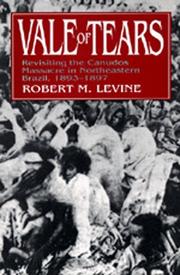| Listing 1 - 4 of 4 |
Sort by
|

ISBN: 3515082557 Year: 2003 Publisher: Stuttgart Steiner
Abstract | Keywords | Export | Availability | Bookmark
 Loading...
Loading...Choose an application
- Reference Manager
- EndNote
- RefWorks (Direct export to RefWorks)
Brazil --- Canudos (Euclides da Cunha, Brazil) --- History --- History.
Book
ISBN: 0822977656 9780822977650 9780822961239 0822961237 Year: 2010 Publisher: Pittsburgh, Pennsylvania
Abstract | Keywords | Export | Availability | Bookmark
 Loading...
Loading...Choose an application
- Reference Manager
- EndNote
- RefWorks (Direct export to RefWorks)
In the late nineteenth century, the Brazilian army staged several campaigns against the settlement of Canudos in northeastern Brazil. The colony's residents, primarily disenfranchised former slaves, mestizos, landless farmers, and uprooted Indians, followed a man known as Antonio Conselheiro ("The Counselor"), who promoted a communal existence, free of taxes and oppression. To the fledgling republic of Brazil, the settlement represented a threat to their system of government, which had only recently been freed from monarchy. Estimates of the death toll at Canudos range from fifteen thousand to thirty thousand.Sentencing Canudos offers an original perspective on the hegemonic intellectual discourse surrounding this monumental event in Brazilian history. In her study, Adriana Michele Campos Johnson offers a close examination of nation building and the silencing of "other" voices through the reinvisioning of history. Looking primarily to Euclides da Cunha's Os Sertões, which has become the defining--and nearly exclusive--account of the conflict, she maintains that the events and people of Canudos have been "sentenced" to history by this work. Johnson investigates other accounts of Canudos such as local oral histories, letters, newspaper articles, and the writings of Cunha's contemporaries, Afonso Arinos and Manoel Benício, in order to strip away political agendas. She also seeks to place the inhabitants and events of Canudos within the realm of "everydayness" by recalling aspects of daily life that have been left out of official histories.Johnson analyzes the role of intellectuals in the process of culture and state formation and the ensuing sublimation of subaltern histories and populations. She echoes recent scholarship that posits subalternity as the product of discourse that must be disputed in order to recover cultural identities and offers a view of Canudos and postcolonial Latin America as a place to think from, not about.
Cunha, Euclides da, --- Brazil --- Canudos (Euclides da Cunha, Brazil) --- History --- Historiography. --- In literature. --- da Cunha, Euclides
Book
ISBN: 9788579820076 Year: 2010 Publisher: SciELO Books - Centro Edelstein
Abstract | Keywords | Export | Availability | Bookmark
 Loading...
Loading...Choose an application
- Reference Manager
- EndNote
- RefWorks (Direct export to RefWorks)
Intentamos esboçar, palidamente embora, ante o olhar de futuros historiadores, os traços atuais mais expressivos das sub-raças sertanejas do Brasil ... . [trecho retirado da nota preliminar do livro].
History --- Brazil --- Latin America --- HIstory. --- Annals --- Auxiliary sciences of history --- Canudos (Euclides da Cunha, Brazil) --- Asociación Latinoamericana de Libre Comercio countries --- Neotropical region --- Neotropics --- New World tropics --- Spanish America --- HISTORY

ISBN: 0585181519 0520917189 9780520917187 9780585181516 0520203437 0520075242 Year: 1992 Publisher: Berkeley (CA) : University of California Press,
Abstract | Keywords | Export | Availability | Bookmark
 Loading...
Loading...Choose an application
- Reference Manager
- EndNote
- RefWorks (Direct export to RefWorks)
The massacre of Canudos In 1897 is a pivotal episode in Brazilian social history. Looking at the event through the eyes of the inhabitants, Levine challenges traditional interpretations and gives weight to the fact that most of the Canudenses were of mixed-raced descent and were thus perceived as opponents to progress and civilization. In 1897 Brazilian military forces destroyed the millenarian settlement of Canudos, murdering as many as 35,000 pious rural folk who had taken refuge in the remote northeast backlands of Brazil. Fictionalized in Mario Vargas Llosa's acclaimed novel, War at the End of the World, Canudos is a pivotal episode in Brazilian social history. When looked at through the eyes of the inhabitants of Canudos, however, this historical incident lends itself to a bold new interpretation which challenges the traditional polemics on the subject. While the Canudos movement has been consistently viewed either as a rebellion of crazed fanatics or as a model of proletarian resistance to oppression, Levine deftly demonstrates that it was, in fact, neither. Vale of Tears probes the reasons for the Brazilian ambivalence toward its social history, giving much weight to the fact that most of the Canudenses were of mixed-race descent. They were perceived as opponents to progress and civilization and, by inference, to Brazil's attempts to "whiten" itself. As a result there are major insights to be found here into Brazilians' self-image over the past century.
Millennialism --- NON-CLASSIFIABLE. --- Amillennialism --- Chiliasm --- Millenarianism --- Millennianism --- Postmillennialism --- Premillennialism --- Dispensationalism --- Fundamentalism --- Millennium (Eschatology) --- History --- 19th century --- Brazil. --- Conselheiro, Antônio, --- Cunha, Euclides da, --- Maciel, Antônio Vicente Mendes, --- Mendes Maciel, Antônio Vicente, --- Brazil --- Canudos (Euclides da Cunha, Brazil)
| Listing 1 - 4 of 4 |
Sort by
|

 Search
Search Feedback
Feedback About UniCat
About UniCat  Help
Help News
News